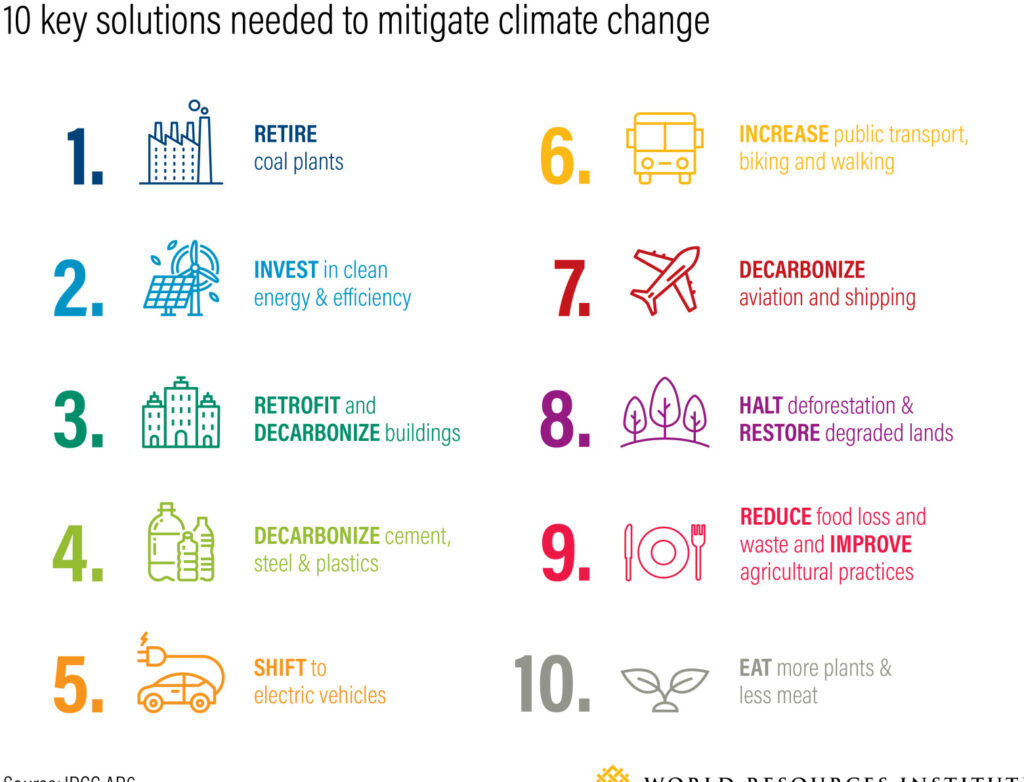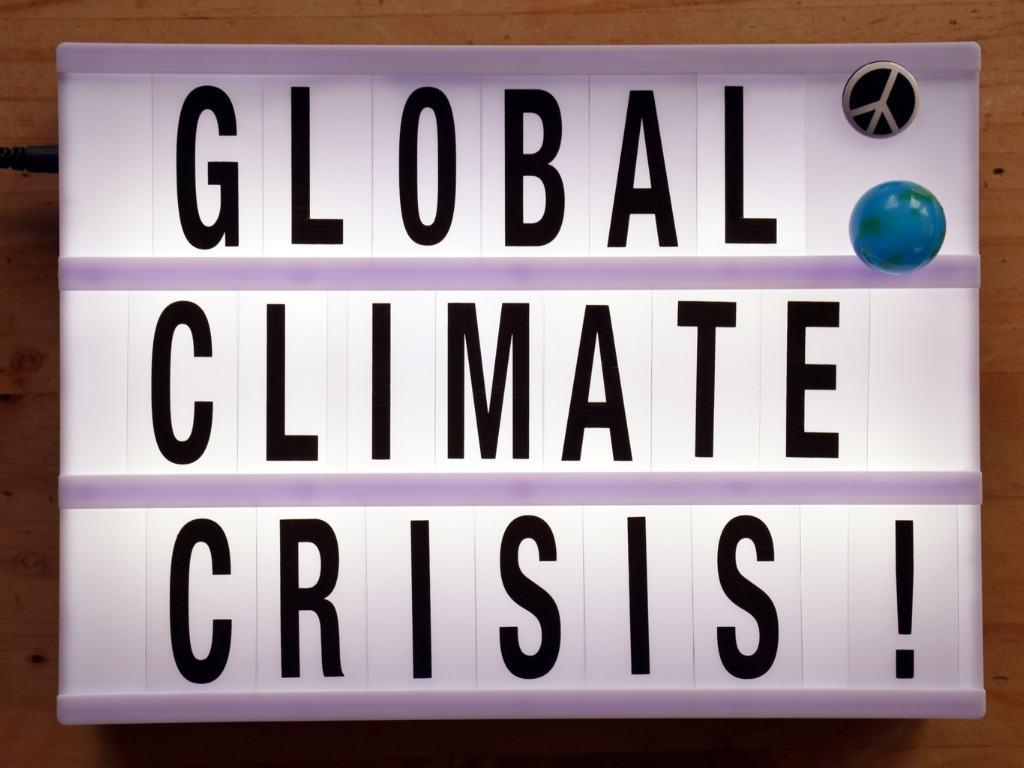7 Mins Read
The latest IPCC report is out and the findings are distressing and we highlight the ten most important ones you need to know.
It’s been a big week for the climate emergency. The Intergovernmental Panel on Climate Change (IPCC), the UN-founded body charged with “advancing scientific knowledge about anthropogenic climate change” released its latest report this past Monday, March 20th, also known as the Sixth Assessment Report or AR6 Synthesis Report, and in case you’ve been living under a rock, its findings are dire. The full report PDF is not yet out, but the 36-page Summary for Policymakers and the 85-page Longer Report make for sobering reading. Below, we break down the key conclusions for you.
1) It’s the end of the line for action: we are out of time.
One of the more alarming statements in the IPCC report is the following: “Projected CO2 emissions from existing fossil fuel infrastructure without additional abatement would exceed the remaining carbon budget for 1.5°C (50%) (high confidence).” In plain English: the likelihood that of passing 1.5°C in global warming is 50%.
It may feel like we’ve said this before (and we have) but once again, the science could not be more clear: we are out of time. The report was clear that human action has already caused 1.1°C of global warming to the Earth’s climate, which it described as “unprecedented in recent human history”.
CNN’s chief climate correspondent Bill Weir put it best: “We are committing suicide by fossil fuels and the amount of effort and speed it will take to head off the worst disasters is stunning.”
2) 2040 is the new 2050
In his press conference (watch it here) to announce the report, United Nations Secretary-General Antonio Guterres said that he has proposed “a G20 a Climate Solidarity Pact”, one in which “all big emitters make extra efforts to cut emissions, and wealthier countries mobilize financial and technical resources to support emerging economies in a common effort to keep 1.5 degrees alive” and said the IPCC report was a call to “super-charge efforts” to achieve our global climate goals, and stated 2040 as the new deadline. “Leaders of developed countries must commit to reaching net zero as close as possible to 2040, the limit they should all aim to respect…This can be done. Some have already set a target as early as 2035,” he said. Gutteres ended his speech by imploring us to act at “ warp-speed” on climate action.
3) More extreme, more often: weather events to be felt by all
Changes in our atmosphere, intensifying water cycles, droughts, tornadoes- weather-related climate crisis consequences are going to continue to get more serious and happen more frequently. This is no longer a maybe, it’s already happening. While all nations are affected and will pay the physical, societal and financial price for our rising emissions, IPCC warned governments that countries must prioritise adaptation measures to mitigate the most serious effects.
3) Fossil fuels are finally called out as the cause of the climate crisis
HEATED, one of the best newsletters on the climate crisis out there, had some great insights on the report in their latest issue around the evolution of the occurrence of the term ‘fossil fuels’ in IPCC reports. According to their reporting, as recently as 2021 fossil fuels were not mentioned at all in the IPCC summary for policymakers about the causes of climate change. Last April 2022, fossil fuels were cited 44 times in the 50-page IPCC summary report*. In this latest report, fossil fuels were mentioned 16 times as the cause of the crisis. IPCC is clear-eyed that no new oil, gas or coal project financing or licenses (which makes President Joe Biden’s recent Willow approval hugely problematic). Going forward, oil and gas companies will have an increasingly harder time obfuscating their role and responsibilities.
*Note: as they point out, the summary report, which is what most people read, is not the actual report, which usually numbers over a thousand pages.
4) We need to talk about climate justice
Minorities, women, people from developing countries and low-income folks are the ones who will pay the highest price for climate emergency consequences: “Increasing weather and climate extreme events have exposed millions of people to acute food insecurity and reduced water security, with the largest adverse impacts observed in many locations and/or communities in Africa, Asia, Central and South America, LDCs, Small Islands and the Arctic, and globally for Indigenous Peoples, small-scale food producers and low-income households.”
5) We gotta REMOVE, not just REDUCE
Unfortunately, lowering emissions, even by a huge amount, will no longer be enough to stave off the worst consequences of the climate emergency. We are now in a position whereby we need to urgently focus on CO2 removal from the atmosphere too.
As per the report: “Reaching net zero GHG [greenhouse gas] emissions primarily requires deep reductions in CO2, methane, and other GHG emissions, and implies net-negative CO2 emissions. Carbon dioxide removal (CDR) will be necessary to achieve net-negative CO2 emissions.”
This means we need to continue to prioritize climate tech investments (this is a good intro guide to the space) while also keeping up the necessary scrutiny on the sector.
6) “Everything, Everywhere, All At Once”
Secretary-General Gutteres is nothing if not pop culture relevant. He borrowed the Oscar-winning movie title to underline that there is no silver bullet here, we have to do everything we can, across all sectors, both in the public and private spheres and with all the tools at our disposal, from behavorial change to regulation to tech innovation to activism if we want to mitigate the worst consequences.

7) Limiting temperature rise to 1.5 degrees Celsius is still technically feasible.
We’ve actually still got time and hope. But what’s missing is political will and awareness at all levels of society, business and government.
The report called out ten key solutions that require our attention and our investment from retiring coal plants to investing in renewable energy, retrofitting buildings, decarbonizing construction inputs, shifting to EVs, increasing public transport, biking and walking, halting deforestation, decarbonizing aviation and shipping, reduce food loss, food waste and improve agricultural practices, and shift to plant-centric, low-meat diets – all detailed in the above graphic.
8) Show Me the Adaptation Money!
To quote another famous Hollywood movie, ‘show me the money!’ is another very loud message from Guterres and the report authors. While IPCC was clear that the vast majority of countries on the planet will need to start considering adaptation measures to handle immediate and near-term risks and build implementation, measures and efforts are not enough. What we need urgently is more climate finance. The IPCC said that by 2030, developing countries need at least $127 billion per year to fund adaptation measures, and today, they are getting less than 10% of this.
9) Our kids are paying the price for our ignorant and/or mal intentioned decisions
One of the most heartbreaking and piercing graphics in the latest IPCC report is the above one that illustrates future emissions scenarios based on age today. It’s a visual that cuts straight through the ultimate injustice of the climate emergency: those who have the least control over the decisions made to control are those whose lives and futures will be most affected.
10) Food system change is called out as the key to reducing emissions but the diet shift imperative is not strong enough
Raphaël Podselver, Director of UN Affairs at ProVeg International, an organisation whose mission is to transform global food systems by promoting plant-based and cultivated alternatives, said that the IPCC report makes clear the need to shift towards plant-based diets to reduce greenhouse gas emissions but believes the report does not go far enough to underline that food systems account for one-third of global emissions and said the report is “a ‘missed opportunity’ to raise awareness about the effects of diet on the climate” noting that “direct recommendations from past reports exploring the potential of alternative proteins to mitigate the impact of emissions from food systems immediately were not mentioned in the synthesis.”




